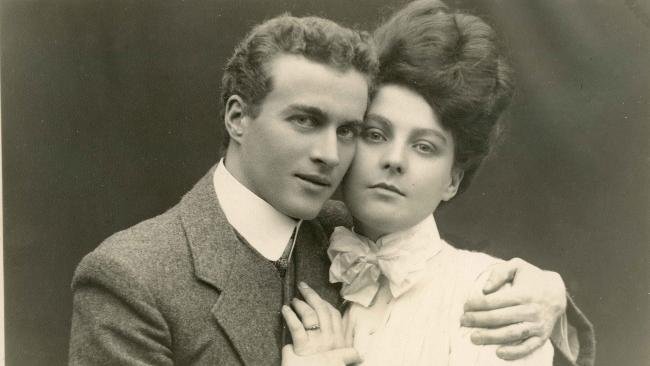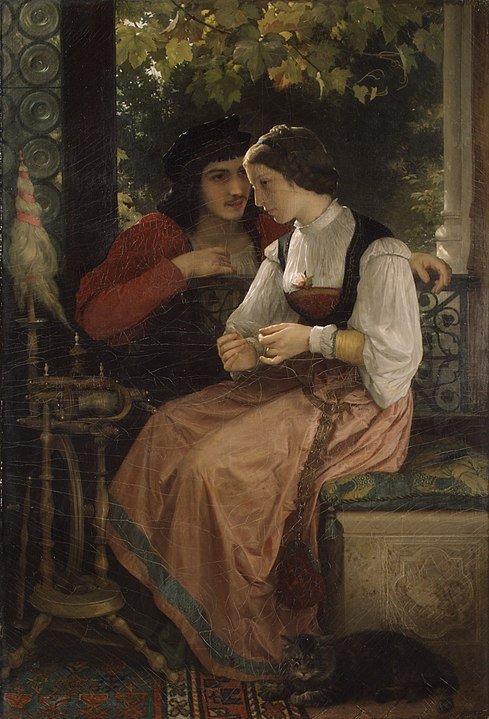
In the text below, I build up the case for "Marriage means freedom". Please, challenge me, I welcome every debate which offers me to see my weak points. By having the weak points commented on, I can iron out such weaknesses in the further course in order to improve my arguments. Now, let's begin the case.
The fact that it can be "any belief" that you adhere to is what we are experiencing.
Since my life is short and I have no time to run after "any belief", I learned to look at those principles, I've already got brought to me through my very culture. Which is Christian.
If you have a rule, meaning a principle, then there are always serious exceptions to this rule.
But if you now elevate the exception to the rule as a rule,
nothing remains of the rule. You destroy it. In other words, you take less serious reasons but want to make them look as if they weigh heavily.
Take the commandment "Thou shalt not kill".
The exception to this rule would be, as we know, if you acted in immediate self-defense because a murderer was about to kill both you and others in your house. To protect your life and theirs, you kill him. Still, the rule does not say "You are allowed to kill", it says plainly "Don't kill."
Stating the obvious
It would be foolish to define "self-defense" as a rule, because then it would say: "You shall kill in self-defence".
Firstly, this is obviously a strange formulation and would therefore not be a commandment but a permission (which refers to the actual principle of not killing); secondly, such a sentence does not allow for an exception of its own. Which would be "other reasons than self defense", and there you have it: There is no other legitimate reason to kill.
Therefore, the principle "Do not kill" (unless there is absolutely no way out and you are under immediate threat) is correct.
To soften the rigour of this principle would be to make more and more exceptions seem absolutely necessary, while being dishonest about the necessity.
That would be like sawing the legs off a table. Calling its "legs" a "table".
The same applies to a couple's relationship.
This is going to be the main theme of this text.
If you say that you want to honour your husband or wife until death do you part, but then your husband or your wife commits acts of such severety that remaining in the marriage would do huge harm to both of you, you'd need a way out. Anyone with a reasonable mindset would understand that the exception of this rule is needed.
You don't say that "I will be with you until I will no longer love you" or "untill quarrel does us apart" or "untill I become bored of you".
If you don't make a vow in the first place,
and you miss to make it in the further course, you will, logically as it is, choose or be with a man or woman out of lesser reasons, more unclear than clear. You might as well get together out of excitement or wanting to escape another situation, you name it.

Any reason might sound nice or appealing and since "anything goes" it includes frivolous respective whimsical impulses. If no clear principle is set before the bond then you end up with what we've got today on a broad scale. Since anything can be taken as a reason to marry, anything can be taken to break up.
"Anything" represents exceptions.
It lays a blanket over the very principle and makes it disappear. It elevates the exception to a rule. You can observe it in your own breakups as well as in the breakups of other couples who, in order to justify their separation, exploit the very principle by which they did not come together, yet - funnily enough - use it all the while in order to have an excuse for ending a relationship.
After all, nobody tells his friends or parents: "Oh, we separated just so, out of no particular reason." Which, in case one came together for a lesser reason then the willingness to form a lifelong commitment, would be the truth. The second best truth would be to say: "I actually don't know why we came together."
The principle serves as a principal because in the moment you commit yourself to it, you mean it in full spirit and a heartfelt state of being. You mean it, here and now, no matter what (will come). But if you don't mean it here and now, then you think of a future of exception and want to have a back door. Then the sentence actually must sound like this: "I will honour you depending on the matter." But where is the honour?
A pact doesn't work that way.
No commitment works in advance with back doors already in mind (and equally bad: with nothing in mind). The language in which it operates tightens you to the most important promise which you are able to give. Because it is difficult to give, you give it and not because it is easy to give. For easy given things you don't need a vow.
A vow aims straightly at what people say when they tell you that you shall choose your man or woman wisely.
Otherwise, one would say "Pick your spouse because you feel lonely" (excited, thrilled, flattered, sexy etc.). But do you know anyone who does say so? They all are going to tell you "Do it out of love." But love remains a mere word when you don't connect it to the very ideal - the foundation - on which love stands.
Since it came out of habit to utter those words to each other as well as in the presence of witnesses, expectations were lowered. Insecurities elevated. Now, feeling insecure means being uncertain. Being uncertain (is he/she the right one?) leads to postpone a promise and having a relationship "just so" without its promise and in avoidance of marriage.
Avoiding marriage avoids the official act of the covenant, it avoids a sincere strong commitment, spoken out loud. It supports weakness. Though one may utter them superficially as if they were sincere (you know very well when that happens).
Is it not very interesting that uttering a commitment of that kind "to honor you until death does us apart" produces unease?
Now, that is its very function. You shall feel uneasy imagining that if you'd say it out loud and you would not fully stand behind it, that this produces discomfort. The discomfort is a friend. It whispers the truth.
If you are a fan of "any belief", not saying it at all is the way out, is it not?
The tricky mind finds excuses for the very avoidance of uttering the vow,
doesn't it? It lies about its significance. It tells you: "It's out-dated. It's old fashion." As if this was a reasonable argument.
It argues: "But isn't marriage an evil invention of bigots?", "Does it not imprison man and woman? What about free love? Is man not a biological being and therefor also an animal in its urges?"
It goes so far as to say that religion is the very root of evil in "making people to stick together with no escape", which then is presented as "marriage as a prison".
Completely ignoring the fact that marriage - commonly - has never been a prison from which there was no escape,
but that if someone wanted and wants to escape a horrendous marriage, that is exactly what was and is being done. Now, what this mind desires is to escape without any costs.
Such mind insists on the lie that the exception - bad men beat up (abuse, betray, neglect etc. etc.) their wives - is the norm and not, which is the truth, that the norm is good men who love and want to protect their wives; but it is consistently presented upside down.
Now, that is the trick of a mind which wants to avoid commitment,
which avoids to acknowledge the finest rule because it wants to be spared the inconveniences of such rule. But still, appears very likely to become a judge itself once its sensation gets aroused.
For the very same mind will become enraged when its spouse is committing adultery and will accuse the other of being "dishonest and a liar" ("toxic", as they say today). This mind will either scream or cry, accuse hotly or coldly, but it will accuse. It will advise someone else who accuses her husband or his wife of "being hurtful" to "let her bleed" and "let him pay".
"The tragedy of love is in love, not in marriage."
There is not unhappy marriage that might not be an equally unhappy concubinage, or a far more unhappy seduction. Whether the tie be legal or no, matters something to the faithless party; it matters nothing to the faithful one.
G. K. Chesterton
This leads to look at the involved ones. When none of the two enters their relationship in the spirit of the ideal, why should they complain and suffer in case they decide to separate? What valid reason shall they name?
They can't name one. Because they did not mean it sincerely in the first place. So, producing a drama out of something which was build on lesser things than the ideal is hypocrisy.
Why do you think a Christian marriage is subject to an oath
and on top of that you want witnesses to the marriage to be present?

Why is it given so much importance?
If you make a vow under witnesses, then it is those who were present when you made the vow who, should you doubt your marriage, feel weak or speak ill of the other person, shall remind you of your pact.
This is their role. They made the commitment to take a special place in the lives of the couple as witnesses, which is why there are four of them. They are the first insurance in case he or she struggles with a conflict in the relationship.
The community, all relatives and friends, are the second insurance.
Each of them will have a judgement that if the spouses separate, only a very serious reason will be accepted by them as a separation. We all know exactly what these reasons are. So if you break the marriage and you don't have a severe case, everyone is entitled to shame you.
The shaming is justified,
because why should it fail to materialise when the vow has been broken? But no one will shame you if there are very serious reasons for someone to leave their husband or wife.
For this reason alone, adultery is considered inexcusable. If it comes to light that one has betrayed the other, both the person who actively committed the betrayal and the person who acted as a seducer give legitimate reason to shame them and to make them suffer the consequences.
The fact that such shaming may not take place
from witnesses, community or friends is when none of those involved took the marriage seriously at all, including the married couple itself.
In such cases, the most honest thing to do is to save yourself the artificial drama and admit that none of it was really for a serious reason and let the grass grow over it, so never speak of it again, nor hold any grudges against each other. Make better sure not waste many years over it.
So where the ideal played no role in the first place, it would be unnecessary and presumptuous to labour the point of shame.
You are not entitled to shame someone if you yourself don't believe in an oath.
But of course, it could happen that others may shame you, for they took their oaths to their heart.
But we can basically save ourselves any gossip, because if marriages are entered into frivolously, then confusion is pre-programmed and the drama is a consequence of this confusion. But drama here is not the result of an oath being broken. Where none has ever been made, none can be violated. So for this reason, marriage - undergone in this way - always has no highest significance, but only low significance, if at all.
Why marriage is being held in low esteem has the plain reason that such minds who hold it low, forgot about love.
Of course, if you already know all this,
then you can come clean to any man or woman you want to have sex with.
You could say that when you spend time together, it's not a serious thing for either of you, that there are no plans to check each other out from the point of view of a potential husband or wife.
You can then say: We'll spend time together until we don't feel like it anymore. We don't want children, we don't want to swear to be faithful to each other, and we don't want to make any kind of commitment to each other apart from the one condition that we find each other attractive. If we no longer appeal to each other, then we separate. Is that a deal?
This would also mean that if someone falls ill, if their life goes through a hard phase, if someone from your inner circle dies, you can't expect anything from such "partner in favor". The other person doesn't need to bring you a cup of tea in bed, does not need to help you through a crisis, does not need to come to a funeral or help you out financially.
To expect such things would be downright dishonest. As soon as things are no longer fun and easy with you, he or she has every right to walk away - just so. That is only logical. For you did not receive any strong promise.
Now, if that sounds all nice and groovy, go for it.
If no commitment is the thing, then don't commit.

But if you expect, against all better judgement, that a hedonistic alliance includes "love me and accompany me through thick and thin" (because, quite honestly and most likely, you can't help it), you begin to realise just how hypocritical you can be.
Now then, if there are people who manage to pull off this honest act and both handle it properly so as not to leave the other in the dark, they may do it. This would always be preferable to getting involved with each other without even knowing why.
But if I were to place a bet on how many alliances of this kind are formed, I would say it would be one in a million. Everyone else has expectations of each other. And why shouldn't they?
For me personally, I have made it clear that
marriage means enormous freedom.
By taking the oath of marriage, I save myself thousands of hours of headaches and heartaches, I free myself from the misery of insecurity, I feel protected by my husband and I no longer have any reason to complain about trivialities that my unstable ego is not able to cope with.
If I find someone other than my husband attractive, I can be happy about it, safe in the knowledge that although this kind of affection is nice, I am free from having to polish up my occasionally insecure self-image. I don't send ambiguous messages, I allow myself to be plain happy about compliments and yet I don't need to go any further than that.
I free myself from jealousy, as the vow of fidelity stands between every temptation that unquestionably overtakes every man and woman countless times. To live under the principle of the marital vow and call it a "yoke" or "prison" is a profound lack of understanding and the inversion of the exception into the rule.
This, this distortion of the truth, is the real prison for love.
Any discomfort that is initially triggered by the marriage vow, but then overcome, is light-hearted.
But where it is neither said, felt nor thought, it cannot unfold its power. Placing oneself under this protection creates free men and women who, when they have children, are able to exemplify free love. The Christian thing about it is that such a free spirit is very well able to recognise eccentric views of life as a contrast and does not fight them, but merely rejects them clearly for itself. Which is a difference.
The non-combat is misconstrued as weakness, but for the one who tries to present marriage as unnecessary, bigoted and ridiculous, it is a losing battle. Only the mind who admits its own values are lost finds itself threatened by those who uphold them.
If you love in such a way that you bind yourself forever, then you are free.
Because only the forever bond frees you as a man and as a woman. As paradoxical as that may sound.
Picture sources:
By Unknown author - The Australian (http://www.theaustralian.com.au/news/arts/talking-cure/story-e6frg8n6-1225954189012), Public Domain, https://commons.wikimedia.org/w/index.php?curid=12362136
Von William Adolphe Bouguereau - 1. Ursprung unbekannt2. Metropolitan Museum of Art, online collection (Met Objekt Kunstwerkkennung 435753), Gemeinfrei, https://commons.wikimedia.org/w/index.php?curid=59268
By Lippo Vanni - http://www.wga.hu/frames-e.html?/html/v/vanni_l/index.html, Public Domain, https://commons.wikimedia.org/w/index.php?curid=3898071
By Richter, Gustav Karl Ludwig, 1823-1884 (artist); L. Prang & Co. (publisher) - Flickr: Odalisque, Public Domain, https://commons.wikimedia.org/w/index.php?curid=16021542
Other sources:
https://unsecretogigantesco.com/wp-content/uploads/2020/06/The-G.-K.-Chesterton-Collection-50-Books-PDFDrive.com-.pdf
https://de.wikipedia.org/wiki/Verlobung
https://en.wikipedia.org/wiki/Engagement
https://en.wikipedia.org/wiki/Concubinage

